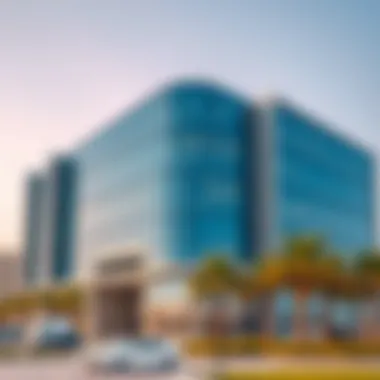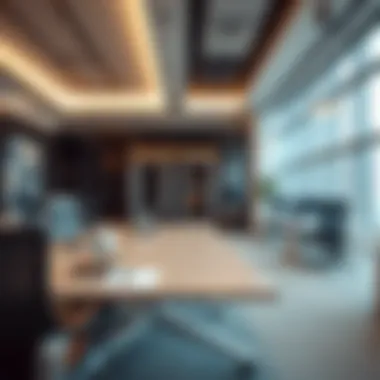Exploring Office Trends and Developments in Dubai


Intro
Dubai's office landscape is not just a reflection of its bold architecture and glimmering skyline but an intricate tapestry shaped by various factors. In a city where innovation meets tradition, understanding the evolving dynamics of office spaces becomes essential for investors, renters, and expatriates alike.
The office projects in Dubai are rising like hot cakes, each tailored to cater to diverse business needs. From co-working spaces buzzing with creativity to traditional office setups offering stability, the array of options is substantial. It’s a market that necessitates an astute comprehension of current trends, geographical hotspots, and cultural influences, directing how businesses prepare their workspace.
In this article, we will explore the intricacies inherent in the office market of Dubai, focusing on the current market trends, viable investment strategies, and the overarching implications for stakeholders. Our goal is to provide a holistic guide that not only informs but equips you with the insights needed to thrive in this competitive environment.
The Commercial Real Estate Ecosystem in Dubai
The commercial real estate ecosystem in Dubai is a vibrant tapestry, woven together by a multitude of factors that dictate not just the nature of office spaces but also the dynamics of business itself. Understanding this ecosystem provides crucial insights for stakeholders, whether they are investors, expatriates, developers, or business owners. It's more than mere bricks and mortar; it’s about adapting to the fast-changing tastes and demands of an ever-evolving workforce.
In a city that serves as a melting pot for cultures, ideas, and industries, the commercial property landscape has transformed dramatically in recent years. The sector has drawn international attention, driven by the Dubai government’s vision to diversify the economy while enhancing its global appeal as a business hub. For potential investors, the environment is laden with opportunities that go beyond the typical high-rise offices found in many global cities. Finding the right niche in this active market can yield lucrative returns.
Considerations about the commercial real estate market here are numerous. First, the sheer pace of development is notable. From iconic structures like the Burj Khalifa to innovative office complexes in Business Bay, the skyline is constantly changing. Investors must keep a keen eye on upcoming districts as well, where new developments are springing up, particularly in areas like Dubai Marina and Jumeirah Lake Towers.
Additionally, the legislative landscape also plays a pivotal role. Where other countries may have lengthy and cumbersome lease processes, Dubai is making strides toward simplifying regulations for ease of doing business. This adaptable regulatory framework can bolster investor confidence, making the ecosystem far more attractive.
"Dubai's real estate market is not just about finding a location; it's about reading the trends and positioning oneself ahead of the curve."
As businesses increasingly prioritize flexibility in their workspaces, understanding the various types of office environments and how they fit into the broader ecosystem becomes essential. The proliferation of co-working spaces and the growing trend of flexible office solutions highlight a shift in how companies want to operate, often driven by a younger workforce that values collaboration and connectivity.
To summarize, the commercial real estate ecosystem in Dubai thrives on continuous innovation, strategic regulation, and a unique cultural diversity that fosters creativity and adaptability. Investors and business owners must navigate this landscape with robust strategies and a clear understanding of its future trajectory. Only by doing so can they unlock the potential that lies within this dynamic marketplace.
Types of Office Spaces in Dubai
In the vibrant commercial landscape of Dubai, office spaces play a pivotal role. They are not just buildings; they are the backdrop against which businesses operate, thrive, and evolve. As the needs of companies shift and the economy fluctuates, the types of office spaces available in the market transform in response. Understanding these spaces is vital for anyone looking to invest, rent, or set up shop in this bustling metropolis.
Traditional Offices
Traditional offices have been the bedrock of business for decades. These spaces offer a straightforward layout designed to facilitate communication and teamwork. Usually characterized by
- Designated private offices
- Conference rooms
- Reception areas
One can find them in many parts of Dubai. Areas like Business Bay and Downtown Dubai house a variety of these office buildings. For companies valuing established office environments, these spaces foster a sense of permanence and stability. They provide a familiar structure, offering a conducive atmosphere for many businesses.
Despite their traditional feel, these offices must adapt. Companies now seek flexibility. New design trends incorporate open spaces to enhance collaboration. Traditional doesn’t mean static; it's evolving without losing its core functions and aesthetics.
Co-working Spaces
Co-working spaces have surged in popularity, particularly among startups and freelancers. These spaces provide a refreshing alternative to traditional offices by breaking down the barriers of exclusivity and creating
- Community-oriented environments
- Shared resources
- Networking opportunities
With unique designs and flexible leasing terms, co-working spaces have become hotspots for creativity and innovation. Locations like Jumeirah Lake Towers have seen a boom in these setups. Members enjoy being part of a diverse group, often leading to collaboration and idea-sharing that might not happen in the confines of a traditional office.
Additionally, co-working spaces typically offer various amenities, including high-speed internet, coffee shops, and meeting rooms. These features create a more relaxed yet productive atmosphere conducive to modern work styles.
Business Centers
Business centers represent a hybrid between traditional offices and co-working spaces. These establishments cater to companies looking for a comprehensive solution without the intensive commitment associated with long-term leases. They typically offer:
- Fully furnished office spaces
- Administrative support
- Meeting facilities
This arrangement is particularly appealing for international firms or those testing the waters in Dubai. The flexibility of short-term leases allows businesses to adapt quickly to changing demands and growth. Also, business centers provide access to essential services that streamline operations, making them ideal for companies wanting to focus purely on their core activities.
Flex Space Solutions
Flex space solutions have emerged as a response to the demand for versatility. This model supports businesses that undergo rapid changes. They feature:
- Fluid office layouts
- Short-term leasing agreements
- Customizable spaces
In a city like Dubai, where market conditions can shift dramatically, such flexibility is invaluable. Businesses can upscale during peak seasons or downsize in quieter times without the frustration of being locked into a lengthy lease. Flex spaces enable companies to be agile. They can adjust their footprint based on projects, employee numbers, or even market trends. Areas such as Dubai Marina have seen an increase in these adaptable office spaces, catering to a diverse range of businesses and satisfying the demand for innovation.


Understanding the various types of office spaces in Dubai provides essential insights into the commercial real estate market. This knowledge empowers investors, entrepreneurs, and expatriates to make informed decisions that align with their unique needs and business goals.
Key Districts for Office Developments
When examining the landscape of office spaces in Dubai, focusing on specific districts offers invaluable insights. Each area has its own flair, catering to different sectors and demographics. Understanding these key districts helps investors, businesses, and expatriates identify the most suitable environments for their needs.
Dubai Marina
Dubai Marina stands out as a prime location for both businesses and investors. This vibrant waterfront district offers a mix of residential and commercial properties, creating a unique ecosystem for work and leisure. The Marina is known for its scenic views, lively atmosphere, and accessibility.
With the construction of several skyscrapers, including commercial towers boasting state-of-the-art facilities, companies looking to establish a presence here can find a modern and appealing environment. The area’s proximity to major transport links, including the Dubai Metro, enhances its attractiveness for employees and clients alike.
Moreover, Dubai Marina's reputation as a lifestyle hub can help companies attract top talent, as professionals are often drawn to locations that offer leisure activities alongside work.
Downtown Dubai
Downtown Dubai is synonymous with luxury and innovation. Home to iconic landmarks like the Burj Khalifa and the Dubai Mall, this district is a magnet for multinational companies and startups alike. The area's mix of high-end office spaces and premium retail outlets creates a dynamic atmosphere that is appealing to a diverse range of businesses.
Investors spotlight Downtown Dubai not only for its aesthetic appeal but also for its robust infrastructure. The accessibility of major highways, coupled with the efficient public transport system, makes it convenient for both clients and employees. With many notable businesses anchoring their operations here, the presence of networking opportunities rises, making it an attractive option for companies seeking growth.
Business Bay
Business Bay has swiftly established itself as a focal point for commercial and corporate entities in Dubai. This district is strategically located and is known for its modern architecture and comprehensive urban planning. Offering a variety of office spaces, from premium towers to more flexible solutions, it caters to various business needs.
One of the biggest advantages of locating in Business Bay is its vibrant business community. The synergy among various sectors creates a competitive environment that can spur innovation and collaborations. In addition, the area’s proximity to the Dubai Water Canal presents a picturesque setting, further enhancing its allure as a workplace.
Jumeirah Lake Towers
Jumeirah Lake Towers, often referred to as JLT, presents a unique blend of functionality and lifestyle. Known for its cluster of towers surrounding artificial lakes, JLT harmonizes business and leisure spaces effectively. This layout contributes to a relaxed work environment, drawing professionals who appreciate the greenery amidst the urbanism.
This district is particularly appealing for small to medium-sized enterprises, as it offers a variety of affordable office solutions without compromising on quality. The availability of amenities, such as restaurants and fitness centers within walking distance, makes it more convenient for employees. Moreover, the community-focused atmosphere fosters networking, making it an attractive destination for entrepreneurship and innovation.
"Understanding the dynamics of each district is paramount for investors and businesses eyeing growth in Dubai's competitive market."
Each of these districts not only reflects the socio-economic growth of Dubai but also influences the direction of the office market in the city. As trends evolve, keeping an eye on these key areas will help in leveraging opportunities effectively.
Market Trends Influencing Office Space
The office space market in Dubai is undergoing a remarkable transformation, with trends that are not just fleeting fads but sustainable changes that could shape the future. Exploring these trends provides key insights for investors, businesses, and real estate agents alike. These market movements are essential for adapting to an increasingly complex working environment.
Rise of Remote Work
In recent years, the rise of remote work has been nothing short of extraordinary. The COVID-19 pandemic acted as a catalyst, pushing companies to embrace flexible work arrangements. As a result, many organizations have recognized that productivity can thrive outside of traditional office settings. In Dubai, we see businesses reevaluating their need for expansive office spaces.
Remote work provides an appealing way for companies to cut costs on physical spaces. This trend enables firms to invest in better technology or employee wellness programs instead. However, it simultaneously raises questions about the long-term implications for office space needs. Some organizations are opting for hybrid models that blend in-office and remote work, fostering collaboration while allowing flexibility. This nuance has led to an increased leasing interest in smaller, adaptable spaces rather than conventional large offices.
Sustainability and Corporate Responsibility
Sustainability is more than a buzzword; it has become integral to business practices, particularly in vibrant markets like Dubai. Corporates are feeling the heat to incorporate eco-friendly measures into their operations. Whether it’s energy-efficient buildings, better waste management, or sustainable materials, clients expect a strong commitment to the environment.
Moreover, corporate responsibility plays a vital role. Developing an office space with a focus on sustainability can enhance a brand’s image, attract environmentally-conscious talent, and comply with evolving regulations. According to a report from the Dubai Green Economy Partnership, businesses prioritizing green solutions often witness substantial returns on investment, fostering goodwill among both employees and customers.
Notable Actions for Sustainability:
- Implementing renewable energy sources.
- Designing spaces with natural lighting to reduce energy consumption.
- Investing in smart technology that monitors resource usage.
Technological Advancements
Technology is revolutionizing how office spaces are designed and utilized. In Dubai, the rise of smart buildings equipped with advanced technologies is making headway. Tools such as IoT devices, automated systems, and cloud-based platforms are changing the game in real estate. These advancements allow for efficient management of space and resources, yielding cost savings for tenants and landlords alike.
For instance, companies can now utilize software to analyze occupancy rates and optimize layouts accordingly. Furthermore, features like smart lighting, temperature control, and security systems not only make buildings safer but also enhance employee experience. This integration of technology allows businesses to respond better and adapt to fluctuating demand.
"As we step into this new era, the ability to leverage technology for space utilization may make or break the success of an office in a competitive market like Dubai."


Legal Considerations for Office Leasing
Navigating the office leasing landscape in Dubai warrants a solid understanding of the legal frameworks that govern these transactions. For investors, entrepreneurs, and businesses alike, being well-acquainted with legal considerations is crucial. It not only safeguards one's interests but also streamlines the leasing process. In this part of the article, we'll focus on three fundamental aspects of leasing: the regulatory framework in Dubai, the intricacies of lease agreements and terms, as well as potential risks and how to mitigate them.
Regulatory Framework in Dubai
Dubai's legal environment for real estate leasing is laid out through several regulations and laws. The Real Estate Regulatory Agency (RERA), for example, oversees the property market, ensuring transactions uphold a particular standard. Their guidelines provide a transparent foundation, helping investors and tenants feel secure in their dealings.
One key aspect is the Dubai Land Department (DLD), which is responsible for property registration. It's essential for landlords and tenants to register their leases accurately to avoid any future disputes. Another important element involves the Tenancy Law, which covers tenant rights and landlord obligations, solidifying protections for all parties involved. Understanding these regulations can prevent misunderstandings that lead to costly disputes.
Additionally, adherence to local laws about property taxes and commercial licenses is mandatory. For instance, businesses must ensure they have the proper operating licenses, or risk facing fines and operational interruptions. This regulatory landscape demands close attention to detail, as overlooking these elements could spell trouble down the line.
Lease Agreements and Terms
A lease agreement is the cornerstone of any rental transaction. It outlines the responsibilities, rights, and obligations of both the landlord and tenant. This document should be both thorough and clear, avoiding any ambiguity that could lead to conflict. Common provisions included in agreements are the lease duration, rent amount, payment terms, and conditions for termination.
In Dubai, it's common practice for leases to span from one to several years. Understanding what happens at the end of the lease term is essential; tenants should be aware of renewal options or potential rent increases.
While many leases may use standard templates, it’s wise to seek legal advice to review specific terms that could be unique to individual situations. This is particularly true concerning clauses related to maintenance responsibilities and dispute resolution methods. When both parties are crystal clear on the terms of the lease, it fosters a healthier and more productive leasing relationship.
Potential Risks and Mitigations
Leasing office space is not without its risks. Among them, misunderstandings regarding property conditions, alterations to space, or lease termination can pose significant threats to a smooth operation. Here are some of the unexpected pitfalls that might arise, alongside ways to mitigate them:
- Property Damage: It's vital to conduct thorough inspections before signing any lease. Documenting the property's condition can help avoid disputes over damages at the end of the lease.
- Market Fluctuations: Economic changes can impact rental prices. Securing a long-term lease with a fixed rate could protect you from sudden spikes.
- Misunderstood Terms: Complex legal jargon can often lead to confusion. Seeking legal expertise to clarify lease terms and conditions will greatly reduce misinterpretation risks.
- Non-Compliance with Regulations: Staying updated on local laws can safeguard against potential legal infractions. Regular consultations with real estate professionals ensure that your historic knowledge of leasing law is top-notch.
Ultimately, understanding legal considerations in Dubai's office leasing landscape is imperative for navigating this ever-evolving market. Being equipped with knowledge in regulations, lease agreements, and risk mitigation strategies helps all stakeholders work smarter, not harder.
In essence, navigating the complexities of office leasing in Dubai is best approached with a well-informed mindset and readiness to adapt to evolving legal landscapes. Every step matters, and ignorance is not an option.
Choosing the Right Office Space
Selecting the right office space in Dubai is no small feat; it’s like finding a needle in a haystack but with higher stakes involved. The office environment can shape not only the productivity and well-being of employees but also determine the overall image of a business. When businesses take the plunge into the Dubai real estate market, they face an array of choices—ranging from trendy co-working hubs to traditional corporate offices. The right fit is essential since it directly influences numerous factors including staff satisfaction, operational efficiency, and even client perception.
A well-chosen office can be the difference between simply getting by and thriving. By evaluating specific elements such as location, accessibility, size, and amenities, companies can navigate this complicated landscape with confidence. Moreover, understanding these aspects enhances decision-making for investors and businesses alike.
Assessing Location and Accessibility
Location, they say, is everything. In Dubai, this adage rings particularly true. The city is divided into distinct districts, each with its unique character and advantages. An office’s location can affect not only employee commuting times but also the types of clients or partners that can easily access your business.
- Proximity to Transit: Choose an area with robust public transportation options. Places like Business Bay and Downtown Dubai boast metro stations that make life easier for employees.
- Client Accessibility: If a firm deals frequently with visitors, consider areas that offer easy access to major attractions, hotels, or business centers.
- Fortune in a Flash: A more central location may demand higher rents, but it often offers greater visibility and foot traffic, potentially leading to increased business opportunities.
To put it plainly, if your office is stuck in a far-flung corner of the city, you may as well be closed for business on the days people can't find you.
Understanding Space Requirements
Space requirements should not be an afterthought. Firms often underestimate the impact of office layout and dimensions on operations. A cramped space can be stifling, while too much room can lead to unnecessary costs. Hence, it’s critical to strike that balance.
- Headcount Considerations: Factor in the current and projected number of employees. Are you planning to hire more in the coming years? Considering growth is pivotal.
- Future Flexibility: The rise of hybrid work models implies that flexibility is key. Look for spaces that allow for reconfiguration, whether by removing partitions or adjusting spaces for collaborative work.
- Dedicated Spaces: Does your office need meeting rooms, lounges, or quiet areas for focused work? Mapping these needs helps in understanding the overall square footage that’s essential.
Remember, choosing the right space isn’t just about fitting desks in a room; it’s about effectively designing a habitat where innovation can flourish.
Evaluating Amenities and Facilities
Amenities play a crucial role in modern offices. They can affect both employee satisfaction and potential recruitment. Offices in Dubai are increasingly offering striking facilities, which means selection isn’t just a numbers game anymore.
- Essential Services: Check for features like high-speed internet, reception services, or even parking availability. These services can save time and frustration.
- Wellness Features: Facilities such as gyms, relaxation zones, and even access to green spaces can boost morale and productivity.
- Social Spaces: Environments encouraging social interaction, like coffee bars or lounges, are becoming vital. They can enhance team cohesion and bring forth collaboration.
"Investing time in choosing the right office space can yield long-term returns that far outweigh the initial headaches involved in the selection process."
In summary, investing time to choose the right office space isn’t merely about physical space. It intertwines with your company’s identity, influences employee experience, and can shape the trajectory of your growth in Dubai’s competitive market.
The knowledge of these vital factors will support firms in making informed decisions that not only satisfy immediate needs but also anticipate future developments, ensuring a holistic approach to managing investments.


Investment Opportunities in Office Spaces
The current climate of Dubai's office market presents a veritable goldmine for savvy investors. Understanding Investment Opportunities in Office Spaces is crucial for those aiming to navigate the complexities of commercial real estate in this vibrant city. From emerging sectors to strategic locations, there’s a myriad of factors that make this market particularly appealing.
Why Invest in Office Spaces?
Investing in office spaces in Dubai is more than just a financial decision; it's an opportunity to leverage Dubai's status as a global business hub. With its strategic geographic location, combined with world-class infrastructure, Dubai attracts numerous multinational corporations. As a result, the demand for quality office spaces is continually on the rise.
Moreover, investing in offices can yield substantial benefits. Landlords often enjoy attractive rental yields—sometimes exceeding 8%—in key districts. This is supported by the influx of expatriates and local businesses seeking prime locations to establish themselves.
Analyzing Return on Investment
Evaluating Return on Investment (ROI) is indispensable when considering office space investments. Potential investors should take a multi-faceted approach:
- Market Trends: Keep a keen eye on prevailing trends. Office spaces designed with sustainability in mind or flexible work arrangements tend to attract tenants faster.
- Location Assessment: A premium location could reflect in higher rental yields. Areas like Business Bay and Downtown Dubai often command higher prices but offer greater returns.
- Cost of Operation: Don’t just factor in purchase price; evaluate maintenance and operational costs as well. This will help present a clearer picture of potential profits.
Investors must also be prepared to adapt to changing work environments. The blending of remote work with traditional office needs necessitates spaces that are functional and cater to the evolving demands of the workforce.
Emerging Markets and Growth Potential
As we look ahead, emerging markets in Dubai's real estate sector signal exciting prospects for growth. Areas previously considered secondary are rapidly becoming desirable, as infrastructure developments unfold.
- Diverse Sector Growth: Sectors such as technology and digital services are seeing tremendous growth. The rising number of tech startups and innovative companies establishes a robust demand for office spaces tailored to their unique needs.
- Government Initiatives: The Dubai government continually introduces initiatives to enhance ease of doing business, which in turn draws foreign direct investment and drives demand.
- Cultural Shifts: With the increasing emphasis on remote and hybrid work models, co-working spaces and flexible office arrangements are gaining popularity. Investors are recognizing the need to diversify their portfolios to include these options.
By keeping an eye on these emerging trends, investors can align themselves with transformative shifts in the marketplace, placing their resources in high-demand sectors that can potentially yield higher returns.
"Invest wisely and adapt to the shifting sands of Dubai’s office landscape. Those who align their strategies with market demands will reap the rewards."
Understanding the dynamics of local and global economies while adapting to these transformations can significantly influence investment success in Dubai's office market.
Future Outlook for Dubai's Office Market
The office market in Dubai is at a pivotal moment. Influenced by a tapestry of economic, cultural, and technological shifts, the future of office spaces is not only about physical structures but about understanding the evolving needs and behaviors of businesses and employees. As we navigate this intricate landscape, it’s clear that stakeholders—from investors to employees—must stay informed about what lies ahead.
Predicted Market Trends
Several trends are coalescing to shape the predicted future of Dubai's office market.
- Increased Flexibility: The rise of hybrid working models is compelling many businesses to seek spaces that allow for adaptability. Companies are looking for offices that can evolve with their needs—think modular layouts or easily reconfigurable spaces. This demand for flexible office solutions is poised to reshape leasing agreements, as landlords may need to accommodate shorter-term contracts and variable space requirements.
- Focus on Technology Integration: Technology is no longer simply a tool; it's central to how offices operate. The integration of smart building technologies, such as automated lighting, HVAC systems, and occupancy sensors, is expected to increase. This provides better resource management while enhancing employee well-being. Offices that successfully integrate these technologies will likely stand out in the competitive Dubai market.
- Sustainability Practices: With increasing awareness around sustainability, more businesses will seek green office spaces. Buildings that meet LEED or BREEAM certification standards will likely become more desirable. The push for environmentally-friendly choices is not just a trend but a reflection of a broader cultural shift towards corporate responsibility and social stewardship.
"Sustainable practices in office design are no longer optional. They're becoming the baseline for future developments."
- Shift in Urban Development: Certain districts of Dubai, like Downtown and Jumeirah Lake Towers, will continue to experience growth. However, we may also see emerging regions capturing interest. Locations that provide a balance of accessibility and lifestyle amenities are becoming hot spots for office developments.
These trends highlight that knowledge and adaptability will be key for anyone keen on investing in or leasing office spaces in Dubai.
Adapting to Changing Work Environments
The work environment is no longer just a place to punch the clock; it represents a dynamic space that must cater to varied employee experiences and corporate cultures. Adapting to these changes is imperative for businesses aiming to thrive in Dubai's competitive landscape.
- Employee-Centric Design: Companies are rethinking their office layouts to prioritize collaboration and creativity. Open spaces with breakout areas are increasingly preferred, facilitating team interactions while providing quiet zones for concentrated work. This shift encourages businesses to invest in interior design that fosters a sense of community and well-being.
- Mental Health Considerations: The significant focus on mental health, especially in light of the ongoing pandemic, emphasizes the need for well-designed work environments. Natural light, greenery, and calming aesthetics are becoming staples in modern office design. Businesses that embrace these elements may see improved employee satisfaction and productivity.
- Health and Safety Standards: Post-pandemic, ensuring employee safety is paramount. Office designs will likely incorporate more health-conscious features, such as better ventilation systems and touchless technology to minimize contact points.
Navigating these changes requires a keen sense of the prevailing winds in office space design and corporate culture. The organizations that can effectively adapt will not only thrive but also attract the best talent in an increasingly competitive environment.
In summary, the future of Dubai's office market promises a blend of innovation and tradition—a landscape where flexibility meets sustainability, and where the human experience remains at the forefront.
Culmination and Recommendations
In any examination of the office market in Dubai, it's crucial to draw conclusions that not only summarize findings but also direct future actions for both investors and businesses. The landscape is not static; it reflects continuous evolution driven by changing economic factors, work habits, and technological advancements. Therefore, the conclusions drawn here are designed to serve as a compass for decision-making amidst this dynamic environment.
Importance of the Finale
The final thoughts on the office landscape provide significant insight into what has been discussed throughout the article. They underscore the importance of understanding market trends, legal frameworks, and the overall growth potential of Dubai's real estate sector. An astute investor or entrepreneur should grasp these insights to adjust their strategies effectively. Future prospects, influenced by sustainability, technology, and cultural changes, paint a vivid picture of what the office space could evolve into.
Recommendations for Action
- Conduct Thorough Research: Investors should keep a close eye on emerging trends. Tools such as market reports and real estate analytics platforms can illuminate which areas possess growth potential, such as Business Bay or Downtown Dubai.
- Consider Flexibility: With remote work reshaping expectations, adopting flexible office solutions may lead to better space utilization and lower costs for businesses. Thus, looking into co-working spaces or flexible lease options could be advantageous.
- Sustainability Matters: There’s a growing demand for sustainable office spaces. Companies should prioritize green certifications, as they enhance appeal to modern consumers and align with global corporate responsibility goals.
- Legal Awareness: Ensure a strong understanding of lease agreements and local regulations. Missteps here can impact long-term investment returns significantly.
- Networking: Building relationships with real estate professionals, from agents to developers, can open doors to valuable insights and opportunities in the market.
"Success in Dubai's office market is not merely about finding a space, but understanding the entirety of the ecosystem around it."
By synthesizing these recommendations with the information provided earlier, both investors and businesses can navigate the challenges posed by Dubai's ever-evolving office landscape with confidence. In a city that’s known for its rapid evolution, adapting to change is not just beneficial; it's essential.



